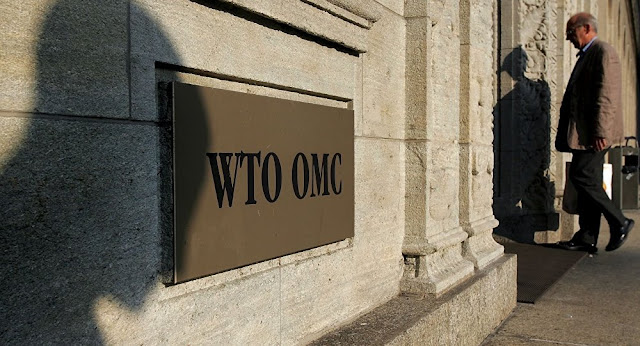Press - India Slams US for Blocking Hunger Solution at WTO
India Slams US for Blocking Hunger Solution at WTO
ASIA & PACIFIC
While
the US has alleged that countries with impressionable GDP are availing WTO
concessions in the name of “self-proclaimed” development status, India has
accused the US of derailing efforts to solve the world's hunger problem by
refusing to endorse public stockholding for food security.
New
Delhi (Sputnik) — India has strongly condemned the US' denial to endorse a food
security solution at the ongoing 11th WTO ministerial meet (MC11) claiming that
such move by a major country could irreversibly damage the credibility of the
WTO. Issuing a statement, India's Ministry of Commerce said that major member
country has reneged on a commitment made two years ago to deliver a solution of
critical importance for addressing hunger in some of the poorest countries of
the world.
"Today
in the agriculture negotiations in Buenos Aires, a major country stated
categorically that they cannot agree to any permanent solution on the public
stockholding issue at MC11. This has posed a severe threat to a successful conclusion
of the Conference as there was a Ministerial mandate for a permanent solution
by MC11. India is surprised and deeply disappointed that despite an
overwhelming majority of Members reiterating it, a major member country has
reneged on a commitment made two years ago to deliver a solution of critical
importance for addressing hunger in some of the poorest countries of the world.
This has the potential to irreversibly damage the credibility of the WTO as a
Ministerial Decision of all countries present in Nairobi has not been
honored," India's Commerce Ministry said without directly naming the US.
Meanwhile,
reacting on the US stance that some of the richest countries in the world had
been availing WTO concessions in the name of "self-proclaimed"
development status, India's Commerce Minister Suresh Prabhu claimed that India
is a right candidate for preferential treatment as it is home to more than 600
million poor people. "Differential treatment to countries with low
per-capita income is one of the fundamental objectives of the World Trade Organization
(WTO)," he said.
"While
in India, we are proud of our GDP and growth rates of recent years, propelled
by innovative economic policies of my government, we cannot ignore that India
is home to more than 600 million poor people,"Commerce Minister Suresh
Prabhu, who is attending the WTO ministerial meet in Buenos Aires, said.
Earlier
at the WTO ministerial discourse on public stockholding for food security
purposes, US Trade Representative Robert Lighthizer had said that five of the
six richest countries in the world were seeking concessions.
"We
need to clarify our understanding of development within the WTO. We cannot
sustain a situation in which new rules can only apply to the few, and that
others will be given a pass in the name of self-proclaimed development status.
There is something wrong, in our view, when five of the six richest countries
in the world presently claim developing country status," Lighthizer said.
Experts
in India are of the opinion that the US denial to back the concept of public
stockholding for food security purposes is reminiscent of the compulsion on its
exchequer to reduce the burden of subsidies given to farmers who go into losses
when their products do not find a way to the global market.
"US
is just looking at newer markets. The US has excess produce which it wants to
sell to big markets like India. Lesser opportunity for export means the farmers
in the US suffer losses and they have to compensate it from their exchequer.
Farmers are a very strong lobby in US. They are just worried about their
increasing subsidy bill," Vijay Sardana, agri-business expert told
Sputnik.
The
irony is that the US never talks of parity of subsidy to farmers. If WTO is all
about equitable markets, human welfare and due rights to nations then American
farmer has more subsidy. This whole debate is about the contest between farmers
of two countries. It is the treasury of US pitched against the poor farmers in
developing countries, Sardana added.



Comments
Post a Comment